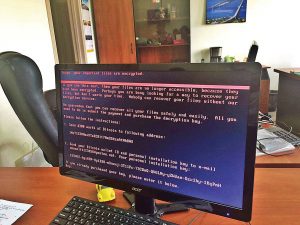The world is still recuperating from a prior outbreak of ransomware, called WannaCrypt or WannaCry, which spread speedily with the use of digital break-in tools formerly produced by the U.S. National Security Agency and leaked to the web recently. And yet again, there is a new and extremely virulent outburst of malicious data-scrambling software that is resulting in mass disruption around the globe, hitting governments and companies, specifically, in Europe.
A serious intrusion was reported by the Officers in Ukraine to its power grid as well as at government offices and banks, where a senior executive posted an image of a dark computer screen that displayed, “The whole network is down.” However, the vital systems of the country were not affected as notified by the Prime Minister. Similarly, the Rosneft oil company of Russia, as well as A.P. Moller-Maersk (a Danish shipping giant), has become the victim of hacking and has narrowly circumvented major damage.
The Copenhagen-based shipping group’s spokesman, Anders Rosendahl, said “We are speaking about a cyber-attack. It has affected all our business branches, at home and overseas.” Even the firms beyond Europe were affected and this was confirmed when the New Jersey-based drug maker Merck said that its systems had also been attacked. The number of agencies and companies supposedly infected by the ransomware campaign was increasing rapidly, and the electronic berserk seemed to be quickly growing into a worldwide crisis.
Nothing much is known about what may be the cause of the disruption at respective companies, but cyber security professionals quickly pinpointed on a type of ransomware. Bit defender, a Romanian cybersecurity firm said, “At present, an enormous ransomware campaign is unfolding worldwide.” Bogdan Botezatu (Analyst) said that it seemed to be almost similar to GoldenEye, which is a type of hostage-taking programs that has been spreading for months. Few analysts refer the new type of ransomware as Petya. A note with contact email is left by this specific type of ransomware.
It is not clear why suddenly the ransomware has become so much powerful, but Botezatu said that it was possibly automatically spreading through a network, without the necessity for human interface. Such self-spreading software, regularly known as “worms,” is mostly feared as they can reproduce quickly, similar to a contagious disease.
Michelle Crorie, who specializes in cybersecurity concerns and is a partner at law firm Clyde & Co., said, “Cyber hacks and Data breaches are one of the prevalent risks faced by business globally. The WannaCrypt attack and now Petya evidently show that hackers do not differentiate which kind of industry they are targeting.”
